Description
SUMO (Small Ubiquitin-like Modifier) proteins are a family of small proteins that are covalently attached to and detached from other proteins in cells to modify their function. Unlike ubiquitination, which targets proteins for degradation, SUMO modification plays a critical role in a number of cellular functions including nucleocytoplasmic transport, gene expression, cell cycle and formation of subnuclear structures such as promyelocytic leukemia (PML) bodies. There are three confirmed SUMO isoforms in human; SUMO1, SUMO2 and SUMO3. SUMO2 and 3 show a high degree of similarity to each other and are distinct from SUMO1. Individual SUMO family members are all targeted to different proteins with diverse biological functions. SUMO1 is conjugated to RanGAp, PML, p53 and IKB-a to regulate nuclear trafficking, formation of subnuclear structures, regulation of transcriptional activity and protein stability. SUMO1 is encoded as a 101 aa protein and the first Met and C-terminal 4 aa are removed from the preprotein.
Applications
- Immunofluorescence staining 1:100
- Immunohistochemistry 1:100
Specification
Immunogen: Recombinant GST-fused human SUMO1 (full length)
Isotype: Rat IgG 2a kappa
Product: The antibody was produced in serum-free medium and purified by proprietary chromatography procedures under mild conditions and conjugated with FITC.
Form: 1mg/ml in PBS, 50% glycerol, filter-sterilized. Azide- and carrier protein-free.
Specificity: Specific to human, simian, mouse and rat SUMO1. Other species have not been tested. Storage: Shipped at 4°C or -20°C and store at -20°C
Data Link Swiss-Prot P63165 (human)
References
This antibody was used in Ref. 3 and 4.
- Ulrich HD “The fast-growing business of SUMO chains.” Review Mol Cell 32: 301-305 (2008) PMID:18995828
- Cheng J et al “Role of desumoylation in the development of prostate cancer.” Review Neoplasia 8:
667-676 (2006) PMID: 16925949
- Uchimura Y et al “Involvement of SUMO modification in MBD1- and MCAF1-mediated heterochromatin formation.” J BioI Chem 281: 23180-23190 (2006) PMID: 16757475
- Saitoh N et al “In situ SUMOylation analysis reveals a modulatory role of RanBP2 in the nuclear rim and PML bodies.” Exp Cell Res 312: 1418-1430 (2006) PMID: 16688858
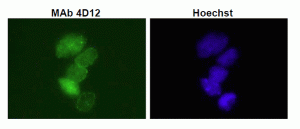
Fig 1. Immunofluorescence staining of SUMO1 with the antibody 4D12 in mouse primary culture neurons. Left: stained with anti-SUMO1 antibody 4D12. Right: DNA stained with Hoechst
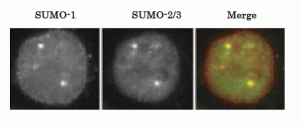
Fig. 2. SUMO-1 colocalizes with SUMO-2/3 as revealed by indirect immunofluorescence staing of C-33A cells (human cervix carcinoma). Left: SUMO-1 was stained with anti-SUMO-1 antibody (4D12) at 10 μg/ml Middle: SUMO-2/3 was stained with anti-SUMO-2/3 antibody (3H12). Right: Merged image
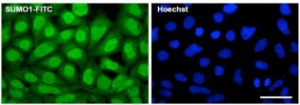
Fig. 3 Fluorescence immunocytochemistry for endogenous SUMO1 expression. HEK293A cells were fixed, permeabilized, and stained with SUMO1-FITC (1: 50) antibody and Hoechst 33342. Scale bar, 50 mm.

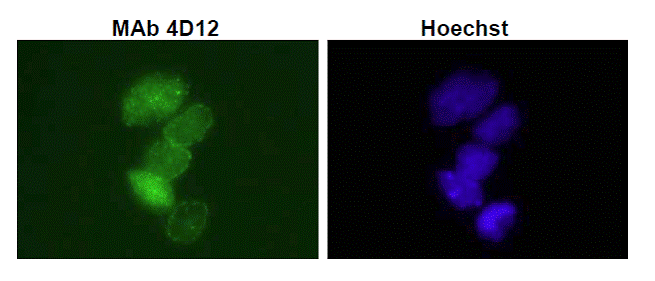
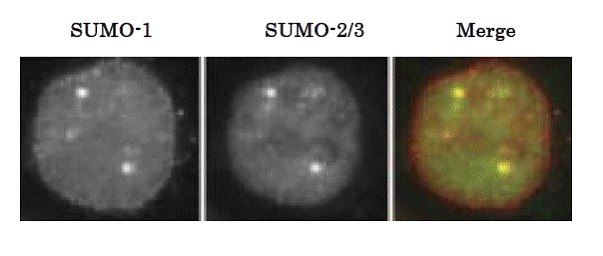

Reviews
There are no reviews yet.